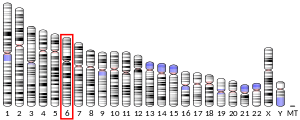Function
The protein encoded by this gene was identified as a binding protein of the MAD2 mitotic arrest deficient-like 1 (MAD2/MAD2L1). MAD2 is a key component of the spindle checkpoint that delays the onset of anaphase until all the kinetochores are attached to the spindle. This protein may interact with the spindle checkpoint and coordinate cell cycle events in late mitosis. Alternatively spliced transcript variants encoding distinct isoforms have been observed.[7]
References
- 1 2 3 GRCh38: Ensembl release 89: ENSG00000124688 - Ensembl, May 2017
- 1 2 3 GRCm38: Ensembl release 89: ENSMUSG00000034509 - Ensembl, May 2017
- ↑ "Human PubMed Reference:".
- ↑ "Mouse PubMed Reference:".
- ↑ Nagase T, Miyajima N, Tanaka A, Sazuka T, Seki N, Sato S, Tabata S, Ishikawa K, Kawarabayasi Y, Kotani H (Jul 1995). "Prediction of the coding sequences of unidentified human genes. III. The coding sequences of 40 new genes (KIAA0081-KIAA0120) deduced by analysis of cDNA clones from human cell line KG-1". DNA Research. 2 (1): 37–43. doi:10.1093/dnares/2.1.37. PMID 7788527.
- ↑ Habu T, Kim SH, Weinstein J, Matsumoto T (Dec 2002). "Identification of a MAD2-binding protein, CMT2, and its role in mitosis". The EMBO Journal. 21 (23): 6419–28. doi:10.1093/emboj/cdf659. PMC 136962. PMID 12456649.
- 1 2 "Entrez Gene: MAD2L1BP MAD2L1 binding protein".
- ↑ Rual JF, Venkatesan K, Hao T, Hirozane-Kishikawa T, Dricot A, Li N, Berriz GF, Gibbons FD, Dreze M, Ayivi-Guedehoussou N, Klitgord N, Simon C, Boxem M, Milstein S, Rosenberg J, Goldberg DS, Zhang LV, Wong SL, Franklin G, Li S, Albala JS, Lim J, Fraughton C, Llamosas E, Cevik S, Bex C, Lamesch P, Sikorski RS, Vandenhaute J, Zoghbi HY, Smolyar A, Bosak S, Sequerra R, Doucette-Stamm L, Cusick ME, Hill DE, Roth FP, Vidal M (Oct 2005). "Towards a proteome-scale map of the human protein-protein interaction network". Nature. 437 (7062): 1173–8. doi:10.1038/nature04209. PMID 16189514.
- ↑ Stelzl U, Worm U, Lalowski M, Haenig C, Brembeck FH, Goehler H, Stroedicke M, Zenkner M, Schoenherr A, Koeppen S, Timm J, Mintzlaff S, Abraham C, Bock N, Kietzmann S, Goedde A, Toksöz E, Droege A, Krobitsch S, Korn B, Birchmeier W, Lehrach H, Wanker EE (Sep 2005). "A human protein-protein interaction network: a resource for annotating the proteome". Cell. 122 (6): 957–68. doi:10.1016/j.cell.2005.08.029. PMID 16169070.
Further reading
- Hoja MR, Wahlestedt C, Höög C (Aug 2000). "A visual intracellular classification strategy for uncharacterized human proteins". Experimental Cell Research. 259 (1): 239–46. doi:10.1006/excr.2000.4948. PMID 10942595.
- Suzuki H, Fukunishi Y, Kagawa I, Saito R, Oda H, Endo T, Kondo S, Bono H, Okazaki Y, Hayashizaki Y (Oct 2001). "Protein-protein interaction panel using mouse full-length cDNAs". Genome Research. 11 (10): 1758–65. doi:10.1101/gr.180101. PMC 311163. PMID 11591653.
- Xia G, Luo X, Habu T, Rizo J, Matsumoto T, Yu H (Aug 2004). "Conformation-specific binding of p31(comet) antagonizes the function of Mad2 in the spindle checkpoint". The EMBO Journal. 23 (15): 3133–43. doi:10.1038/sj.emboj.7600322. PMC 514937. PMID 15257285.
- Stelzl U, Worm U, Lalowski M, Haenig C, Brembeck FH, Goehler H, Stroedicke M, Zenkner M, Schoenherr A, Koeppen S, Timm J, Mintzlaff S, Abraham C, Bock N, Kietzmann S, Goedde A, Toksöz E, Droege A, Krobitsch S, Korn B, Birchmeier W, Lehrach H, Wanker EE (Sep 2005). "A human protein-protein interaction network: a resource for annotating the proteome". Cell. 122 (6): 957–68. doi:10.1016/j.cell.2005.08.029. PMID 16169070.
- Rual JF, Venkatesan K, Hao T, Hirozane-Kishikawa T, Dricot A, Li N, Berriz GF, Gibbons FD, Dreze M, Ayivi-Guedehoussou N, Klitgord N, Simon C, Boxem M, Milstein S, Rosenberg J, Goldberg DS, Zhang LV, Wong SL, Franklin G, Li S, Albala JS, Lim J, Fraughton C, Llamosas E, Cevik S, Bex C, Lamesch P, Sikorski RS, Vandenhaute J, Zoghbi HY, Smolyar A, Bosak S, Sequerra R, Doucette-Stamm L, Cusick ME, Hill DE, Roth FP, Vidal M (Oct 2005). "Towards a proteome-scale map of the human protein-protein interaction network". Nature. 437 (7062): 1173–8. doi:10.1038/nature04209. PMID 16189514.
- Yun MY, Kim SB, Park S, Han CJ, Han YH, Yoon SH, Kim SH, Kim CM, Choi DW, Cho MH, Park GH, Lee KH (Aug 2007). "Mutation analysis of p31comet gene, a negative regulator of Mad2, in human hepatocellular carcinoma". Experimental & Molecular Medicine. 39 (4): 508–13. doi:10.1038/emm.2007.56. PMID 17934339.




